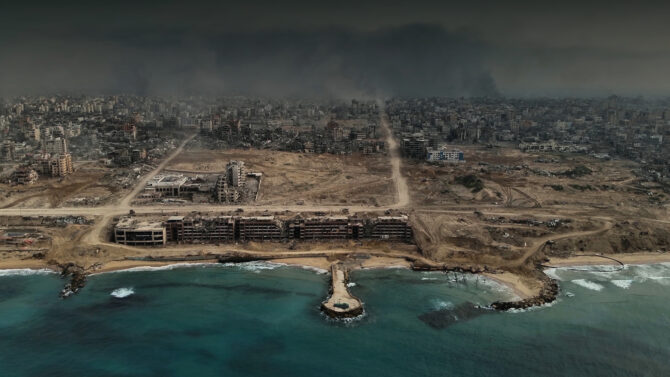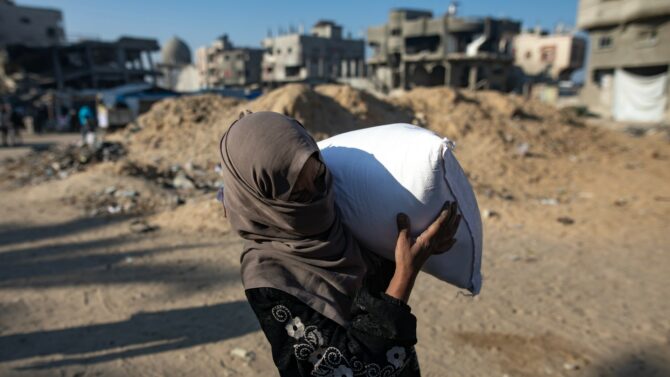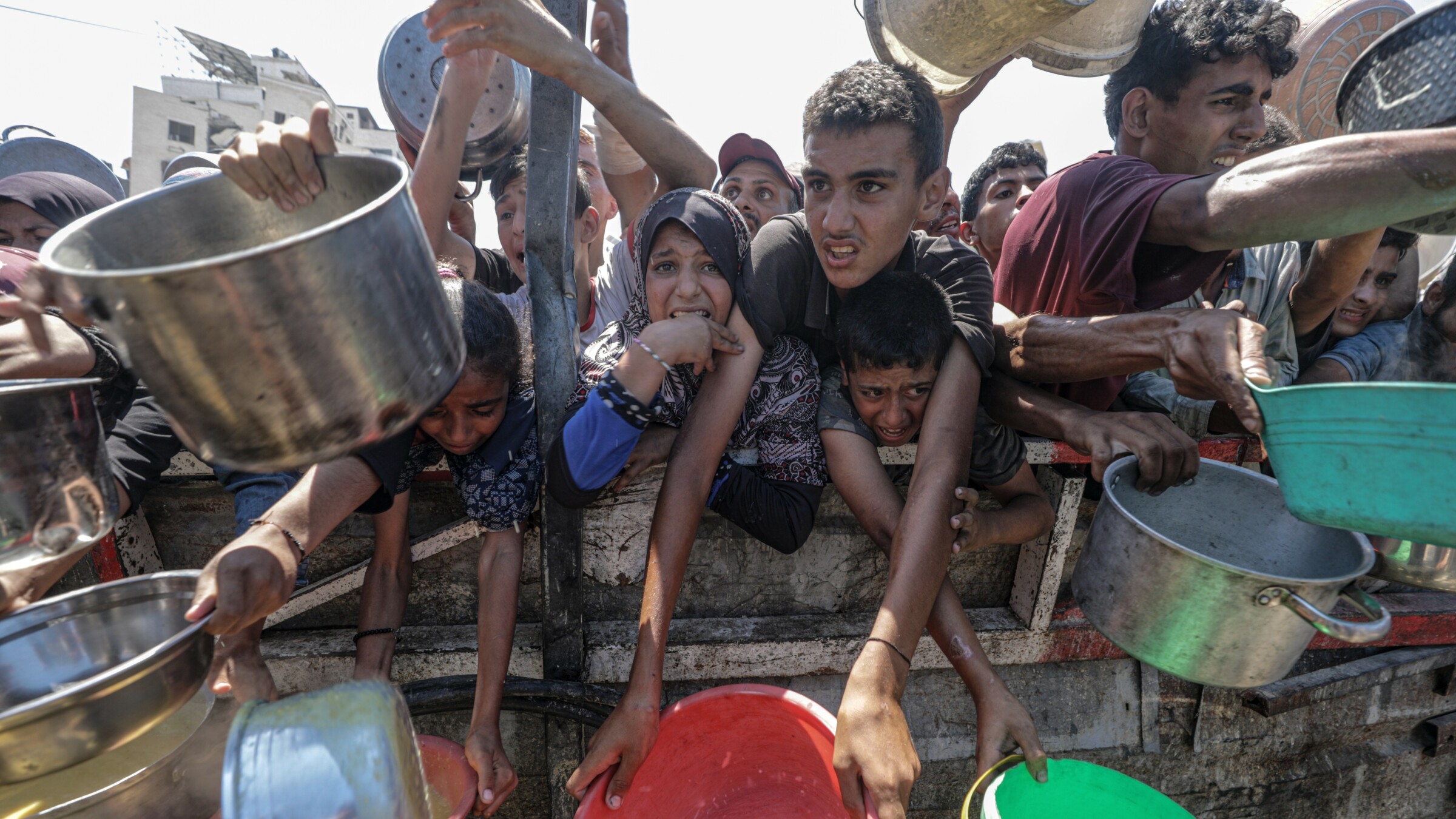Journalists from Israel’s Haaretz, +972 Magazine and Hamakom Hachi Ham Bagehenom explain how they report on the conflict for a reluctant audience
This article was originally published by The Reuters Institute for the Study of Journalism on 18/7/2025 and is hereby reproduced by iMEdD with permission. Any reprint permissions are subject to the original publisher. Read the original article here.
Featured image: Displaced Palestinians collect donated food in Gaza City. EPA/MOHAMMED SABER
Since 2022, Israel has plunged from 86th to 112th on RSF’s Press Freedom Index score. Since Hamas’ attacks on 7 October 2023, almost 200 journalists have been killed in Gaza by the Israel Defence Forces (IDF) and the country is seeing increased media censorship, government boycotts and restrictions of editorial independence.
As this project from our Journalist Fellow Davide Lerner thoroughly documented, jingoism has dominated Israeli TV and Palestinian suffering has often been ignored. Smaller publications have covered the war more critically, but their impact is often limited and don’t reach the massive audiences TV channels command.
Despite the global backlash against the thousands of casualties caused by Israel’s bombing campaign, most Israelis seem to be fine with news coverage of the conflict. A recent poll by the aChord Center of the Hebrew University of Jerusalem suggested that 64% of Israelis said domestic media coverage on Gaza was balanced and did not require broader reporting on the suffering of Palestinians in Gaza.
I wanted to understand how Israeli mainstream media are reporting on Gaza, what kind of media coverage most audiences are exposed to, and how smaller outlets work to fill the gaps left by major news brands. So I reached out to six journalists who work for global and domestic publications to learn more about their work, the work of their colleagues and Israel’s media landscape more broadly.
Can Gaza Ever Be Lived in Again?

The moment that stood out at the Humanity Reloaded Festival, organized by Doctors Without Borders in Athens.
How Netanyahu has captured Israeli TV
According to the journalists I spoke to, Israelis are very interested in current affairs. A survey from Israel’s Central Bureau of Statistics suggests almost half of Israelis get their news via television, which makes it their primary news source.
Recent articles from international outlets like the Guardian and El País have described a news ecosystem driven by aggressive nationalism and official narratives which, with a few exceptions, fails to report on the suffering of Gazans and Palestinians in the West Bank. Even former Israeli Prime Minister Ehud Olmert laid it explicitly to our former Fellow Davide Lerner: “Israeli TV and media don’t show anything from Gaza.”
“People are exposed to deeply militaristic, deeply nationalistic narratives and that’s true for a wide spectrum, from the Zionist center left to the most extreme right,” said El País‘ Middle East Correspondent, Antonio Pita. “This narrative is based on a kind of self-righteousness. They think, ‘The world doesn’t understand us.’ They never question their own actions.”
Earlier this year Pita conducted an experiment. He chose a day at random to watch 10 consecutive hours of news and talk shows on the main Hebrew-language channels: the public channel (Channel 11) and the private channels 12, 13 and 14. Channel 12 has traditionally been the most watched mainstream news outlet, with Channel 13 competing for second place. Channel 14 is an ultranationalist right-wing television channel backed by the government who recently beat Channel 12 in viewer ratings and has been often compared with Fox News.
Pita describes a few recurrent media narratives also reported by journalists at the Guardian: a patriotic show of strength that undermines Palestinian suffering and heightens the Israeli perspective. Many in Israeli media, he suggests, dealt with the national trauma of Hamas’ attacks by downplaying critical coverage of Israel’s brutality, amplifying state narratives and exuding a sense of national unity.
“There is a ‘them or us’ mentality in media coverage,” Pita said. “In the end it has been very difficult for Israeli journalists to show what Israel is doing in all its rawness without framing it in other ways.”
Oren Persico is an Israeli staff writer for The Seventh Eye, an independent Israeli website devoted to journalism and freedom of the press. Persico describes the Israeli media landscape as being under significant attack by the government. Any media outlet not serving as a “complete propaganda tool” for Prime Minister Netanyahu is deemed an “enemy” or “traitor” and is subject to sanctions, closure, or attempts to transform it into a propaganda outlet.
For example, the government of Benjamin Netanyahu has argued for the privatisation of the public broadcaster Channel 11, which it has often called a “propaganda channel” that “damages the State of Israel’s national morale.” Pita’s experiment noted that Channel 11 was the channel that gave the most space to images from Gaza recorded by Palestinians.
The government has also imposed a boycott of the country’s leading left-leaning newspaper, Haaretz. Netanyahu himself has called for the boycott by viewers and advertisers of Channel 12 calling it “fake news” and “antisemitic,” and accusing its owners of carrying out a “terror attack against democracy”.
In mid-2024, Channel 13 appointed Yulia Shamalov-Berkovich, a former Knesset member and perceived ally of Netanyahu, as head of its news division. This move was reportedly backed by Len Blavatnik, the channel’s majority owner and a known associate of Netanyahu. Following her appointment, the network cancelled Ezor Milhama, an investigative programme hosted by journalist Raviv Drucker, who had previously exposed scandals involving Netanyahu and other officials.
Since the 2023 attacks, Persico said, topics that don’t help Israeli morale tend to be ignored by mainstream media. As Channel 14 rises in popularity spouting explicit nationalist and far-right ideology, many mainstream channels have platformed hate speech while ignoring the Palestinian point of view.
Persico also points out that much of the Arab press in Israel is self-censoring itself due to fears of repercussions from the government. In an article he referred me to, Persico spoke to Arab journalists in Israel that have experienced harassment by police and fellow citizens while reporting in the field.
“Ever since the war began [Palestinian citizens of Israel] have been very frightened to speak out because a lot of them have been indicted or interrogated just for showing empathy to relatives in Gaza,” he said. “The Arab press in Israel are afraid to touch this subject. They are afraid to report about Israeli-Palestinians suffering.”
Starvation as a Weapon

After 470 days of war and the ceasefire in January, Gaza’s aid routes reopened, yet severe shortages of essentials persist.
How smaller news outlets cover the war
Despite the subservience of most of Israel’s mainstream news channels, a number of independent news outlets are reporting on their country’s atrocities in Gaza with a critical eye for Israeli audiences. Their impact and their audience are very limited, but some are publishing hard-hitting scoops on the war and punching above their weight.
Israeli journalist Meron Rapoport writes for +972 Magazine and is an editor at Local Call, the magazine’s Hebrew-language sister news site. These outlets support themselves financially through reader revenue and institutional grants. In 2024 the nonprofit that publishes both outlets had an annual budget of around $1.8 million ($1.2 million being from reader support) and a staff of over two dozen.
They have published important investigations that range from probing Israel’s surveillance operations targeting the International Criminal Court and Palestinian rights groups to examining how the army is using artificial intelligence to generate targets for assasination in Gaza.
Similarly to Pita and Persico, Rapoport describes a media landscape where TV channels fail to platform Palestinian perspectives, avoid broadcasting images from Gaza, and uplift the state’s narrative that there are no innocent people in the strip. In fact, the same poll that revealed that most Israelis believe coverage is fair and balanced also revealed that 64% of Israelis believe that “there are no innocent people” in Gaza.
“They just don’t report on Gaza because they think it will damage the overall feeling of unitedness,” said Rapoport. “The slogan coined in the first days of the war was ‘Together we will win’. This was put on a logo with the Israeli flag that was on many commercial TV channels. If together we will win, any report that suggests that Israel is killing innocent civilians in Gaza would harm this togetherness.”
Taking a cursory look at the homepage of both Channel 12 and Local Call in mid-July at the time of this writing, I saw two vastly different news agenda.
Channel 12 does touch on Gaza reporting on testimonies of survivors of the October 7 attacks, highlighting the lives of those who are still kidnapped by Hamas or who were killed, or emphasizing how the IDF is preparing to deal with pro-Palestinian flotillas that set sail towards Gaza.
On the other hand, Local Call’s homepage shows reporting on how the military is using drones equipped with grenades to attack Palestinians in Gaza, how Israeli settlers beat two Palestinians to death in the West Bank, and how settlers forced hundreds to flee from the Jericho area.
This is not new for Rapoport and his team. They have reported on the plight of Palestinians and Gaza much before the attacks and they’ve kept the same attitude during the war. Being able to operate within a newsroom that has both Israeli and Palestinian journalists, Rapoport said, allows his outlet to free itself from the perspective of mainstream outlets.
“We have had so many Palestinian writers from Gaza recruited by +972,” he said. “Once you have a Palestinian reporter on the ground in Gaza witnessing what’s going on, it also affects the way you think and the way you conceive the situation. Other news outlets don’t have this privilege.”
Rapoport said the war has made the role of independent journalism truly crucial: “Even though some of the [mainstream] reporters do really extraordinary work, in the first few months of the war it was difficult for them to refrain from seeing Israel as a victim. It was very natural after such a devastating attack, but still prevented them from seeing and analysing the situation as we did.”
Reporting on war crimes of your own army
Dor Zommer is the editor-in-chief of independent online magazine Hamakom Hachi Ham Bagehenom, a name that can be translated in English as The Hottest Place in Hell. Zommer explains that the name comes from a Martin Luther King quote that originated from Dante’s Inferno: “The hottest place in hell is reserved for those who remain neutral in times of great moral conflict.”
The name of the publication aims to stress the newsroom’s commitment to independent journalism and their stance against neutrality during moral crises.
Echoing the sentiments of those who I spoke to, Zommer describes a reluctance from journalists and the public to digest any empathy towards the other side due to the national trauma of October 7. Many of these TV channels, he said, are ruled by commercial interest, so criticism of the government could lead to audiences tuning out and turning to channels that explicitly flame nationalists sentiments, like Channel 14.
“Most of the people are in the army or in the army reserve or have family members in the IDF,” Zommer said. “If they hear that what their husbands or fathers are doing in Gaza are war crimes, they will not continue to watch.”
Zommer’s digital news outlet operates as a non-profit and gets funded by readers. The latest numbers, from April, showed that their publisher (which also publishes The Seventh Eye) received over 313,000 Israeli shekels (around $93,000) in reader donations that month. They intentionally limit the amount of money readers can donate in order to prevent any single large donor from exerting influence over their work.
“Thousands of people believe in us,” he explains. “We cover issues ranging from the mental issues faced by Israeli soldiers but also articles on what Israeli soldiers did in some towns in Gaza. We are trying to make our coverage balanced.”
Why military censorship matters
Israel’s war reporting is controlled by the military censor, a state authority that operates under the IDF with legal power to control the publication of information deemed harmful to national security.
In Israel, journalists are legally mandated to submit certain types of content to the censor before publication. Many of the journalists I spoke to said that while journalists find ways to get around it, this model leads to self-censorship as reporters may hesitate to investigate controversial topics.
Zommer said that his publication previously focused on social issues such as the #MeToo movement, corruption and asylum seekers. During the war, though, they realised they needed to delve into national security and provide alternative coverage of the IDF.
“The journalists who cover the IDF get most of the TV news time these days and these journalists are fed [information] directly by the IDF spokesperson,” said Zommer. “So we decided to do what is expected of us. We offered alternative coverage and covered the war in a very critical way.”
Netanyahu’s populist playbook
One of the mainstream media outlets that has consistently published reporting on the atrocities in Gaza, in addition to also providing nuanced criticism of the government is Haaretz, Israel’s newspaper of record. A good example is this recent piece on Israeli soldiers shooting unarmed crowds in Gaza, which was widely shared around the world.
In a recent editorial the newspaper put a spotlight on the contrast between the growing headlines of atrocities committed in Gaza and the growing indifference of the Israeli public: “If only the members of the Israeli public would bother to show an interest, they would easily be able to calculate the IDF’s daily crop in Gaza.”
Despite having a more traditional ownership model (the paper is primarily owned by the Schocken family), many international media outlets, including outlets in the Arab world, have praised Haaretz reporting on Gaza.
“At Haaretz, we’re doing our best to report and highlight the facts and voices from Gaza, and our editorials have been consistently calling to end the war, even when it’s hard for parts of the public or even some of our readers to accept, or when the government seeks to punish us for it. We will continue to do so because we believe our readers deserve to know the truth,” said Deputy Editor-in-Chief Noa Landau when I asked her about her newspaper’s work for this piece.
Landau is a member of the Reuters Institute’s Advisory Board and Haaretz is one of the funders of the Institute’s Journalist Fellowship Programme.
Michael Hauser Tov is the Chief Political Correspondent at Haaretz and has been a Journalist Fellow at the Institute for the past few months. Unlike the other journalists I spoke to, he said that most mainstream Israeli media outlets, with the exception of Channel 14, actively challenge the government. But Hauser Tov does agree with the other voices in this piece when it comes to Netanyahu’s treatment of journalists.
He describes the government’s approach as primarily using soft power rather than hard power to affect the media. There isn’t specific legislation to shut down news outlets or journalists feeling physically threatened or at risk of jail.
“Like other populist leaders,” Hauser Tov told me, “Netanyahu tries to colour journalists as enemies of the people, as working against the nation, as being unpatriotic. He keeps attacking and attacking Israeli journalists repeatedly.”
As an example, he mentioned a billboard campaign where Netanyahu displayed pictures of four journalists with the slogan “They will not decide. You will”.
The Netanyahu government has banned the entrance of foreign journalists into Gaza Strip, a tactic that Reporters Without Borders has described as a “methodical attempt to silence the facts, suppress the truth, and isolate the Palestinian press and population.” The government has consistently justified barring independent journalists from entering Gaza based on security concerns.
Hauser Tov dismisses the government’s security concerns as a bad argument for restricting access, stressing there is no good reason to prevent journalists from entering freely.
“There is no problem for any journalist to go freely to the Southern border of Israel, but journalists can’t enter Gaza freely,” he said. “It is risky to get into Gaza these days but every journalist should be able to make this decision for themselves.”
How to measure the impact of small outlets
Hauser Tov said journalism really matters in Israel, where many people are news junkies and TV is the most popular medium.
“Traditional media is very popular and independent media is much less popular,” he stressed. “So independent outlets are not very important in the Israeli media landscape. People do appreciate much more the work of traditional media organisations, so we have few independent journalists and very few independent outlets.”
The other journalists I spoke to acknowledged that Israel’s independent news brands are much less popular than mainstream outlets. But this doesn’t deter them from reporting on unpopular topics.
“It’s tough because 100% of our work will be the things that no one else wants to cover,” said Zommer, from The Hottest Place in Hell. “It would be very easy to go with people’s sentiment and increase our views, but we’re not here for that.”
Rapoport, from Local Call and +972 Magazine, said that while their direct impact on Israeli public opinion might be limited, they’ve had a substantial international impact. Some of their investigations were cited by major foreign outlets and this may help move the needle in terms of global perception and limit Israel’s actions indirectly.
“I feel that we represent all the people living between the river and the sea. These are around 15 million people: half of them Palestinian, half of them Israeli. So in this sense, if that’s the perspective you have, then you are working for the majority of the people between the river and the sea, and that at least gives me some comfort,” he said.

